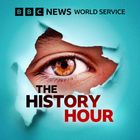
The History Hour
Jan 18, 2025
Josephine McDermott sits in for Max Pearson presenting a collection of the week’s Witness History episodes.
We hear from the author who stumbled across the story of Oskar Schindler while shopping for a briefcase in Beverly Hills.
Our guest is Dr Anne-Marie Scholz, from the University of Bremen in Germany, who reflects on the impact of dramatizations of World War Two.
We also hear about the start of Drum magazine, credited with giving black African writers a voice in the time of Apartheid.
The devastation of the earthquake in the port city of Kobe, Japan, is recalled by a child survivor.
Plus, the New Deal created by President Franklin D Roosevelt to drag the United States from the Depression of the 1930s.
Finally, the family intervention of American former First Lady Betty Ford, which led to the world-famous rehabilitation clinic being started.
Contributors:
Thomas Keneally – author of Schindler’s Ark.
Dr Anne-Marie Scholz - author of From Fidelity to History: Film Adaptations as Cultural Events in the 20th Century.
Prospero Bailey - son of Jim Bailey on the origins of Drum magazine.
Kiho Park – survivor of the 1995 Kobe earthquake.
Adam Cohen – expert on Roosevelt's New Deal.
Susan Ford Bales – daughter of Betty Ford.
(Photo: Nazi SS troops in Germany. Credit: Getty Images)

